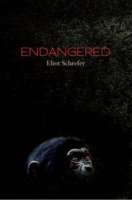
Endangered
Written by Eliot Schrefner
Scholastic Press, 2012, 272 pp.
ISBN: 13–9780545165761
Sophie, a fourteen-year-old girl, travels to “The Democratic Republic of Congo: Where Even the Bullet Holes Have Bullet Holes” (pg. 1), each summer to visit her mother. School and teenage life with her Italian-American father in Miami is different from her summer life with her Congolese mother, whose “life’s project” is establishing and maintaining a sanctuary for rescued bonobos (a type of ape that is similar to humans in DNA). Sophie figures this will be a typical summer, but upon her arrival, her decision to buy an injured and starved bonobo from an illegal trader (breaking her mother’s fundamental rule), leads to a life-altering trip which sets her on a different path in life.
Sophie arrives at the sanctuary and quickly bonds with the young bonobo, whom she names Otto. She nurses him back to health and learns about the other bonobos in the sanctuary as she readjusts back to life in the Congo. Schrefner seamlessly weaves in detailed information about bonobos, their habits, and their relationships with each other for the reader. Through Sophie’s teenage eyes, he also explains the political and historical context so middle-aged readers can understand the unrest that exists within Democratic Republic of Congo.
War soon turns Sophie and Otto’s world upside down. Sophie’s mother has left the sanctuary to visit a bonobo release site and, during the conflict, the sanctuary is overtaken by rebels, leaving Sophie to fend on her own with Otto. Instead of saving herself, she sacrifices her own safety and flees to the jungle with Otto. There they face dangerous situations and experience the atrocities associated with war.
The author, Eliot Schrefner, conveys Sophie’s and Otto’s physical and emotional struggles in a straightforward, yet powerful way that pulls readers into the story. He masterfully portrays the bond that can exist between a human and another living creature. The book was well researched and includes an informative question and answer section with Schrefner indicating his interest and perspective on writing the story. Some readers who have lived in different parts of Africa have commented on Schrefner’s ability to craft an outstanding book about the Congo. Others have commented that some of the events, such as the rebel capture, do not seem believable.
The book is the 2012 National Book Award Finalist for Young People’s Literature. It is a fast-paced read and may be particularly inviting for middle school readers. It is nail-biting and suspenseful, yet an incredibly heartwrenching story that could be paired with the 2012 Newbery award winner The One and Only Ivan, which is told from the point of view of a gorilla who is kept in a cage, or it could be used to discuss mistreatment of animals during war by pairing it with Faithful Elephants: A True Story of Animals, People, and War by Yukio Tsuchiya (1997).
Michele Ebersole, University of Hawaii-Hilo, Hilo, HI
WOW Review, Volume VI, Issue 1 by Worlds of Words is licensed under a Creative Commons Attribution-NonCommercial-ShareAlike 4.0 International License. Based on work at https://wowlit.org/on-line-publications/review/vi-1/

Dear Ms. Wilson,
I would be grateful for some details – which are the facts that I neglected to look up, specifically on Wikipedia?
The novel was written in 2005 and I consulted countless books and other media in order to describe two Jewish families in the 1930s and 1940s as credibly as possible. A good deal of the two years of writing this novel (the German original being much longer than the American edition) was spent on research in Berlin and London. Before going into print, the finished novel was read and approved by two scholars with a degree in Judaism. One of them spent most of her life in Israel.
I am very sorry for any mistake which remained in the book, also for maybe not quite catching the spirit of being Jewish in Britain in the 1940s.
With best wishes,
Anne Voorhoeve